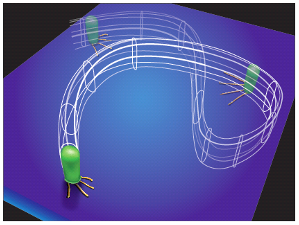Walking Bacteria

How do bacteria adapt their appendages to locomotion on a surface? To date, two main types of bacterial surface motility modes have been identified for P. aeruginosa. Both flagella-mediated swarming motility and pili-mediated twitching motility have been extensively investigated. Using a soft matter physics-based technique to track social behavior of bacteria, we discovered a third type of motility, which occurs during early stages of biofilm formation: On a surface, bacteria orient themselves perpendicular to the surface and ‘walk’ upright using their type IV pili appendages with trajectories that efficiently explore all directions of a 2D surface. We find that bacterial ‘walking’ perpendicular to the surface and ‘crawling’ parallel to the surface represent two distinct foraging strategies on surfaces: the jagged ‘walking’ trajectories are optimized for rapid exploration of local micro-environments, with efficient area coverage, and the smoother ‘crawling’ trajectories are optimized for rapid motion in a fixed direction with efficient distance coverage.
Our new tracking method can delineate the full histories for every individual surface-associated cell in a movie and identify the type of motility appendage used at different times. The information content that we extract from a movie is ~105 times greater than that from traditional microscopy analysis methods, which look at a few cells at a time over a limited time period.
Links to PDF files on website:
- Conrad, J. C., Gibiansky, M. L., Jin, F., Gordon, V. D., Motto, D. a, Mathewson, M. a, Stopka, W. G., Zelasko, D. C., Shrout, J. D. & Wong, G. C. L. Flagella and Pili-Mediated Near-Surface Single-Cell Motility Mechanisms in P. aeruginosa. Biophys J. 100, 1608–1616 (2011).
- Gibiansky, M. L., Conrad, J. C., Jin, F., Gordon, V. D., Motto, D. A., Mathewson, M. A., Stopka, W. G., Zelasko, D. C., Shrout, J. D. & Wong, G. C. L. Bacteria Use Type IV Pili to Walk Upright and Detach from Surfaces. Science 330, 197–197 (2010).
Some of the links to news coverage:
- Science
- NBC News
- Houston Chronicle
- UCLA
- ScienceNews
- PhysicsBuzz (Youtube):